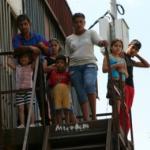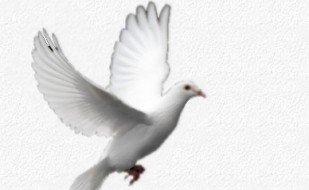The Turkish government has urged German authorities to thoroughly investigate a fire that killed nine Turks in the western German city of Ludwigshafen, sending its own team of inspectors to shed light on the tragic incident, which raised widespread suspicions of arson in Turkey and deepened feelings of insecurity among Germany's Turkish immigrant community.
Turkey joins investigation
State Minister Sait Yazicioglu departed for Ludwigshafen with four officials from the Interior Ministry yesterday (5 February) to join the investigation after German Interior Minister Wolfgang Schaeuble, on a visit to Turkey, agreed to cooperation with Turkish authorities during talks with Prime Minister Recep Tayyip Erdogan on Monday evening.
In initial statements German authorities dismissed the possibility of an arson attack on the building, the residents of which were primarily Turks. But in Turkey, the fire instantly revived memories of a brutal arson attack by German far-right extremists in 1993 in the western city of Solingen that killed five Turks, sparking suspicions that the recent fire could also be an act of anti-Turkish immigrant groups. Turks in Germany have been increasingly anxious due to government acts to toughen conditions for immigrants and a rising anti-immigrant rhetoric among German conservative politicians. This tension within Germany may reach alarming levels if the devastating fire turns out to be a racist attack, dealing a major blow to Turkish integration into German society and causing severe strain in Turkish-German ties.
Turkey called for "meticulous investigation"
"We do not want to go through another Solingen incident," Erdoğan told his Justice and Development Party (AKP). "We are very worried because of the possibility of deliberate action or negligence in this fire, which killed only Turks. … Is xenophobia behind this or not? We hope it is not," he added.
Erdoğan, who is scheduled to visit Germany later this week to inaugurate an international security conference in Munich, said he would also visit the scene of the fire on Thursday.
President Abdullah Gül and Foreign Minister Ali Babacan also expressed concern over the incident, calling on German authorities to shed full light on it. "We expect a meticulous investigation from Germany," Gül told reporters yesterday.
Nine killed, trapped by burning staircase
Nine Turks, including five children, were killed in the fire. German authorities were still investigating the cause of the disaster, while initial suspicions focused on a natural gas explosion or an electric fire. The building's wooden stairs were immediately destroyed by the flames, trapping the residents inside and increasing the number of casualties, authorities said. One child was photographed being thrown out of a window by his parents in an attempt to save him from the flames. He was safely caught by German police officers.
"We are terrified by this tragic event," Thomas Steg, deputy spokesman of the German government, said in Berlin yesterday, adding that the fire should not become a matter of political controversy. Rhineland-Palatinate State Prime Minister Kurt Beck, who rushed to the area after the tragic fire on Monday, talked of a "terrible fire accident" and said there was no indication that it had stemmed from xenophobia.
Witnesses say man in building before fire
But two Turkish girls disagreed with Beck yesterday, saying they saw a German man inside the building holding a bottle in his hand just before the fire. One of the girls, identified as Aylin K., said she had tried to prevent the man from entering but that he eventually forced his way into the building.
Other factors that are feeding arson suspicions are the fact that a German far-right group attacked a coffee house in the neighborhood three years ago and that the building had housed a neo-Nazi club before it was bought by a Turkish family several years ago. Meanwhile, another fire broke out in a building inhabited mostly by Turks in the German city of Herne yesterday; 16 people were injured, but no deaths were reported.
"No solid evidence yet"
"The suspicions mostly stem from local residents' accounts. So far, there has been no solid evidence indicating that an arson attack is to be blamed," said Faruk Sen, head of the Germany-based Center for Turkish Studies (TAM). He warned that the consequences could be "grave" if the incident turns out to be an act of arson by far-right groups.
"I don't want to imagine the consequences if this was a racist attack," Sen told Today's Zaman, emphasizing that the Turkish community in Germany has already been uncomfortable for the past two years due to the aggressive rhetoric on the part of right-wing, conservative politicians against the Turks.
Increase in anti-immigrant rhetoric and practices in Germany
Turks are far better integrated than other immigrant communities in Europe and, in noteworthy contrast to cases like the North Africans in France, they have stayed away from violent protests. But they complain of discrimination at the hands of the government and anti-immigration politicians. Late last year, the German extreme-right party the Republicans (REP) hit the state election campaign in the German province of Hesse with a poster showing a blond girl challenging the imagined viewer, saying "Don't hit on me, Ali," implying an accusation that Muslim males in Germany are "sexually harassing Western women."
More recently, Roland Koch, a member of the Christian Democratic Union (CDU) and governor of the state of Hesse, called for tougher penalties for juvenile immigrants who commit crimes after the December beating of an old German man in a Munich subway by Turkish and Greek youths.
The CDU-led government of Chancellor Angela Merkel pushed for a new immigration law that Turks criticize as discriminatory. Under the law, which went into force last year, immigrants will have to prove their spouses have basic proficiency in German if they want to bring them from their native countries. The provision does not apply to EU countries or several non-EU countries such as the US, Japan and Israel.
Sen criticized the German government stance, and particularly that of State Minister Maria Boehler, who is responsible for immigration and integration affairs, saying it puts all the burden of integration on the shoulders of Turks and blames them for its failures.
"There have been small attacks on immigrants in past years, but there has never been a murderous attack," he said. "I hope this is not one of them."Germany's 2.5-million-strong Turkish community has largely been a bridge for better ties between Turkey and Germany for decades. But Turkish officials have frequently appealed to German authorities to better address Turks' problems since the coming to power of the CDU. Turkish-German ties are strong, but not free of problems, particularly due to Merkel's opposition to Turkey's full membership in the EU.
Family says victims threatened by racist groups
Victims of a fire in the western German city of Ludwigshafen had been threatened by racist groups in the past, their mourning relatives in Gaziantep have stated.
Eight of the nine victims of the fire were from the Kaplan family, whose father Zeki Kaplan migrated to Germany 15 years ago. Kaplan bought the building that was destroyed in Monday's fire 12 years ago and has been subjected to threats from neo-Nazi groups since then, members of the Kaplan family told Today's Zaman. Kaplan ignored threats from the extremist groups and turned the bottom floor of the four-storey building, which had previously been used by German youth for heroin parties, into a commercial coffee house.
German authorities said there were no signs pointing to a xenophobic attack but that the investigation was continuing to find out what caused the fire. Five of the people killed in the fire were children, while another victim was a woman who was five months pregnant. Their bodies are expected to be sent to Gaziantep for burial later in the week.
Male members of the family were employed as workers in German companies, while the women were agricultural workers, according to family members. (TZ/AG)
*This article was published in Today's Zaman on 6 February 2007. Sub-headings were added by bianet.






